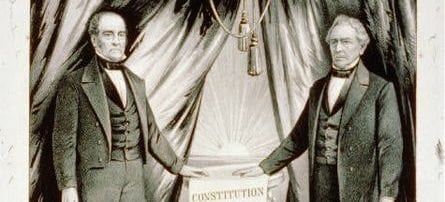Introduction
When President Abraham Lincoln was assassinated on April 14, 1865, Vice President Andrew Johnson (1808–1875), a Unionist wartime governor of Tennessee, became president. President Johnson would be directing Reconstruction as president, making demands on and recognizing Southern governments as they brought themselves into a proper relation with the Union. Johnson released his own Proclamation of Amnesty and Reconstruction on May 29, 1865. Johnson’s approach to amnesty in this proclamation was not substantially different from Lincoln’s, though Johnson did require those with over $20,000 in net assets to apply for special pardon. Johnson did not say anything about how states would be reconstructed in the proclamation; he was thus silent on whether he would require voting rights for freedmen or the protection of civil rights for the states to be readmitted into the Union. None of the state governments that Lincoln had helped to create in Louisiana, Arkansas, Virginia, and Tennessee extended the franchise to blacks, and Johnson recognized those governments. As states begged back into the Union, Johnson directed a process for states to re-adopt constitutions consistent with Union. Johnson appointed a provisional governor of North Carolina on May 29, 1865. The next state government Johnson undertook to reconstruct was Mississippi. It was difficult to find Southerners loyal to the aims of Reconstruction and willing to carry out the Union’s orders, even though they would be backed, initially, at least, with the force of the Union army.
—Scott Yenor
Source: Andrew Johnson, “Proclamation 136 – Reorganizing a Constitutional Government in Mississippi,” June 13, 1865. Online by Gerhard Peters and John T. Woolley, The American Presidency Project. https://goo.gl/XLjiRC.
Whereas the fourth section of the fourth article of the Constitution of the United States declares that the United States shall guarantee to every State in the Union a republican form of government and shall protect each of them against invasion and domestic violence; and
Whereas the President of the United States is by the Constitution made Commander in Chief of the Army and Navy, as well as chief civil executive officer of the United States, and is bound by solemn oath faithfully to execute the office of President of the United States and to take care that the laws be faithfully executed; and
Whereas the rebellion which has been waged by a portion of the people of the United States against the properly constituted authorities of the Government thereof in the most violent and revolting form, but whose organized and armed forces have now been almost entirely overcome, has in its revolutionary progress deprived the people of the State of Mississippi of all civil government; and
Whereas it becomes necessary and proper to carry out and enforce the obligations of the United States to the people of Mississippi in securing them in the enjoyment of a republican form of government:
Now, therefore, . . . I, Andrew Johnson . . . do hereby appoint William L. Sharkey, of Mississippi, provisional governor of the State of Mississippi, whose duty it shall be, at the earliest practicable period, to prescribe such rules and regulations as may be necessary and proper for convening a convention composed of delegates to be chosen by that portion of the people of said State who are loyal to the United States . . . for the purpose of . . . amending the constitution thereof, and with authority to exercise within the limits of said State all the powers necessary and proper to enable such loyal people of the State of Mississippi to restore said State to its constitutional relations to the Federal Government and to present . . . a republican form of State government . . . : Provided, That in any election that may be hereafter held for choosing delegates to any State convention as aforesaid no person shall be qualified as an elector or shall be eligible as a member of such convention unless he shall have previously taken and subscribed the oath of amnesty as set forth in the President’s proclamation of May 29, A. D. 1865, and is a voter qualified as prescribed by the constitution and laws of the State of Mississippi in force immediately before the 9th of January, A. D. 1861, the date of the so-called ordinance of secession: and the said convention, when convened, or the legislature that may be thereafter assembled, will prescribe the qualification of electors and the eligibility of persons to hold office under the constitution and laws of the State . . . .
And I do hereby direct –
First. That the military commander of the department and all officers and persons in the military and naval service aid and assist the said provisional governor in carrying into effect this proclamation; and they are enjoined to abstain from in any way hindering, impeding, or discouraging the loyal people from the organization of a State government as herein authorized.
. . .
Fifth. That the district judge for the judicial district in which Mississippi is included proceed to hold courts within said State in accordance with the provisions of the act of Congress. The Attorney-General will instruct the proper officers to libel and bring to judgment, confiscation, and sale property subject to confiscation and enforce the administration of justice within said State in all matters within the cognizance and jurisdiction of the Federal courts.








































































































































































































